Comprehensive Garden Maintenance Services in Southgate

Maintaining a beautiful garden in Southgate requires dedication, knowledge, and the right tools. Whether you're a seasoned gardener or a novice, understanding the essential aspects of garden maintenance can help you achieve a vibrant and healthy outdoor space.
Southgate's unique climate and soil conditions present both opportunities and challenges for gardeners. With the right maintenance practices, you can ensure that your garden thrives year-round.
In this article, we'll explore various garden maintenance strategies tailored specifically for Southgate residents, covering everything from seasonal care to pest management.

Understanding Southgate's Climate and Its Impact on Garden Maintenance
Southgate experiences a temperate climate, characterized by mild winters and warm summers. This climate is conducive to a wide variety of plants, but it also requires specific maintenance approaches to address seasonal changes.
During the spring, gardens come to life with new growth, making it an ideal time for planting and preparing beds. Summer maintenance focuses on watering, weeding, and controlling pests, while autumn tasks include pruning and preparing plants for the colder months. Winter maintenance involves protecting plants from frost and ensuring that garden tools are properly stored.
By understanding the nuances of Southgate's climate, gardeners can better plan their maintenance activities to keep their gardens healthy and vibrant throughout the year.

Essential Garden Maintenance Tasks for Each Season
Spring Maintenance
Spring is the perfect time to rejuvenate your garden. Start by clearing debris and dead leaves from garden beds. This is also the time to prune shrubs and trees to encourage new growth.
Planting new flowers, vegetables, and herbs can add color and productivity to your garden. Ensure that you choose plants that are well-suited to Southgate's climate for the best results.
Fertilizing the soil in spring provides essential nutrients that support healthy plant growth. Regular watering, especially for newly planted species, is crucial during this period.
Summer Maintenance
Summer brings warmer temperatures, which means increased watering needs. It's important to water your garden early in the morning or late in the evening to minimize evaporation.
Regular weeding helps prevent unwanted plants from competing with your desired species for nutrients and water. Using mulch can also help retain soil moisture and suppress weed growth.
Monitoring for pests and diseases is essential in summer. Identifying and addressing issues promptly can prevent widespread damage to your garden.
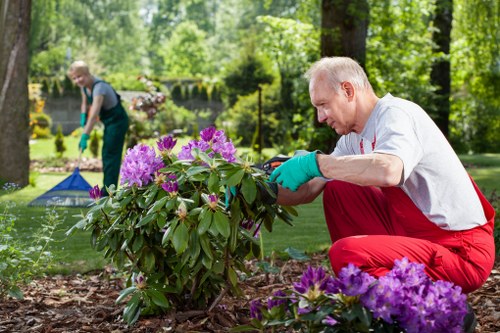
Autumn Maintenance
As temperatures begin to drop, autumn is the time to prepare your garden for winter. Pruning deciduous trees and shrubs helps maintain their shape and promotes healthy growth in the spring.
Raking fallen leaves and incorporating them into the soil can provide valuable nutrients for your plants. It's also a good time to divide perennials and replant them to ensure continued blooming.
Applying a layer of mulch around plants helps insulate the soil and protect roots from frost. Additionally, cleaning and storing garden tools properly can extend their lifespan and ensure they're ready for the next season.
Winter Maintenance
Winter may seem like a dormant time for your garden, but there are still tasks to keep it in top condition. Protect sensitive plants with burlap or frost covers to shield them from harsh weather.
Regularly removing snow from shrubs and trees can prevent breakage from the weight of the snow. Ensuring that drainage systems are clear helps prevent waterlogging when the snow melts.
Taking the time to plan and design your garden for the upcoming year can set the stage for a successful gardening season. Consider what worked well and what could be improved to enhance your garden's beauty and functionality.
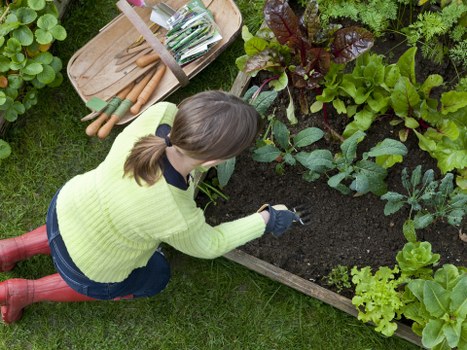
Choosing the Right Plants for Southgate Gardens
Selecting plants that are well-suited to Southgate's climate and soil conditions is crucial for a thriving garden. Consider factors such as sunlight exposure, soil type, and water requirements when choosing plant varieties.
Native plants are often the best choice, as they are adapted to the local environment and require less maintenance. Additionally, choosing a mix of annuals, perennials, shrubs, and trees can add diversity and visual interest to your garden.
Consulting with local nurseries or garden centers can provide valuable insights into which plants perform best in Southgate. They can also recommend specific varieties that are known to be resilient and low-maintenance.
Annuals vs. Perennials
Annual plants complete their life cycle in one growing season, providing vibrant color but requiring replanting each year. Perennials, on the other hand, return year after year, offering long-term beauty with less effort.
Incorporating both annuals and perennials into your garden can ensure continuous blooms and a dynamic landscape throughout the seasons.
- Annuals: Petunias, marigolds, and zinnias.
- Perennials: Lavender, hostas, and daylilies.
Shrubs and Trees
Shrubs and trees provide structure and height to your garden. They also offer shade, privacy, and habitat for wildlife.
Selecting the right size and type of shrub or tree is essential. Consider the mature size of the plant to ensure it fits well within your garden space.
Regular pruning helps maintain the shape and health of shrubs and trees, preventing overcrowding and encouraging air circulation.
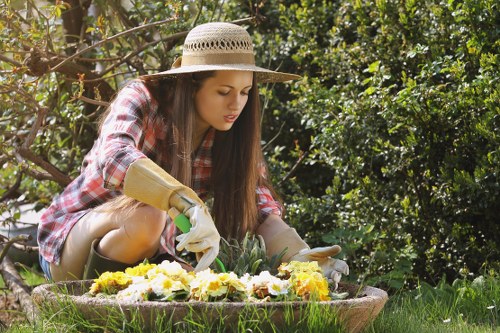
Lawn Care and Maintenance
A well-maintained lawn is the foundation of any beautiful garden. Proper lawn care involves mowing, watering, fertilizing, and controlling weeds and pests.
Regular mowing helps promote even growth and prevents weeds from taking hold. It's important to mow at the correct height for your grass type to encourage deep root development.
Watering your lawn deeply and infrequently encourages drought resistance and reduces water waste. Early morning is the best time to water to minimize evaporation and fungal growth.
Fertilizing Your Lawn
Fertilizing provides essential nutrients that keep your grass green and healthy. In Southgate, it's recommended to fertilize your lawn in the spring and autumn to support growth during these active periods.
Choosing the right fertilizer based on your soil type and grass species can enhance the effectiveness of your lawn care regimen.
- Nitrogen: Promotes leafy growth.
- Phosphorus: Supports root development.
- Potassium: Enhances disease resistance.
Weed and Pest Control
Weeds compete with your grass for nutrients and water, making regular control essential. Hand-pulling, mulching, and using pre-emergent herbicides are effective methods for managing weed growth.
Pests such as grubs and insects can damage your lawn. Identifying and addressing pest issues early can prevent significant lawn damage.
Integrating organic pest control methods helps maintain a healthy ecosystem in your garden while minimizing chemical use.
Reseeding and Repairing Your Lawn
Over time, lawns may develop bare spots due to heavy use or environmental stress. Reseeding or sodding these areas can restore a uniform and lush appearance.
Choosing a grass variety that matches your existing lawn ensures seamless integration and consistent growth.
Proper preparation of the soil, including aeration and fertilization, enhances seed germination and grass establishment.
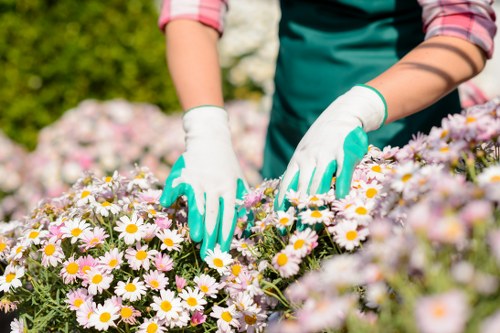
Effective Garden Irrigation Systems
Proper irrigation is crucial for maintaining a healthy garden, especially during Southgate's warm summer months. An efficient irrigation system ensures that plants receive the right amount of water, reducing waste and promoting growth.
There are various types of irrigation systems available, including drip irrigation, sprinkler systems, and soaker hoses. Each system has its advantages, depending on the specific needs of your garden.
Drip Irrigation
Drip irrigation delivers water directly to the plant's roots, minimizing evaporation and water waste. It's ideal for flower beds, vegetable gardens, and shrubs.
This system is highly customizable, allowing you to target specific areas and adjust water flow as needed.
Sprinkler Systems
Sprinkler systems are suitable for lawns and larger garden areas. They provide uniform water coverage, ensuring that your grass receives consistent moisture.
Modern sprinkler systems can be automated with timers and moisture sensors, enhancing efficiency and reducing the need for manual watering.
Soaker Hoses
Soaker hoses release water slowly along their length, providing a gentle and consistent source of moisture. They're perfect for garden beds and row crops, allowing water to seep directly into the soil.
Using soaker hoses can reduce water usage and prevent overwatering, promoting healthier plant growth.
Water Conservation Tips
- Mulching: Applying mulch helps retain soil moisture and reduce evaporation.
- Rain Barrels: Collecting rainwater for irrigation minimizes reliance on tap water.
- Smart Controllers: Using smart irrigation controllers adjusts watering schedules based on weather conditions.
Implementing Rainwater Harvesting
Rainwater harvesting is an eco-friendly way to supply your garden with water. By capturing and storing rainwater, you can reduce your environmental impact and save on water bills.
Connect rain barrels to your downspouts to collect runoff during storms. The stored water can then be used during dry periods, ensuring a steady supply for your garden.
Benefits of Automated Irrigation Systems
Automated irrigation systems offer convenience and precision in watering your garden. With features like timers and sensors, these systems ensure that your plants receive the optimal amount of water without the need for constant monitoring.
This not only saves time but also promotes water conservation, making your garden maintenance more sustainable.

Pest and Disease Management
Protecting your garden from pests and diseases is essential for maintaining plant health and aesthetics. An integrated pest management (IPM) approach combines various strategies to control pests with minimal environmental impact.
Identifying pests and diseases early allows for timely intervention, preventing minor issues from escalating into major problems.
Common Pests in Southgate Gardens
- Aphids: Small insects that suck sap from plants, causing wilting and stunted growth.
- Slugs and Snails: Mollusks that feed on leaves and stems, leaving unsightly damage.
- Spider Mites: Tiny arachnids that cause discoloration and leaf drop.
Disease Prevention and Control
Proper sanitation and cultural practices are key to preventing plant diseases. Remove infected plant material promptly and ensure good air circulation around your plants.
Using disease-resistant plant varieties can also reduce the risk of outbreaks. In cases of severe infection, targeted fungicides may be necessary.
Natural Pest Control Methods
Encouraging beneficial insects, such as ladybugs and lacewings, can help control pest populations naturally. Companion planting, where certain plants are grown together to repel pests, is another effective strategy.
Organic pesticides, like neem oil and insecticidal soaps, offer environmentally friendly options for managing pests without harming beneficial organisms.
Implementing IPM Strategies
Integrated Pest Management (IPM) focuses on combining biological, cultural, and chemical methods to manage pests sustainably. Regular monitoring and accurate identification are crucial components of IPM, allowing for informed decision-making and targeted interventions.
By adopting IPM practices, gardeners can maintain healthy gardens while minimizing the use of harmful chemicals.
Benefits of Sustainable Pest Management
Sustainable pest management practices not only protect your garden but also contribute to broader environmental conservation. Reducing chemical pesticide use helps preserve soil health, protect water sources, and support beneficial insect populations.
Adopting these practices fosters a balanced ecosystem in your garden, promoting long-term plant health and resilience.

Pruning and Trimming Techniques
Proper pruning and trimming are essential for maintaining the shape, health, and productivity of your plants. Different plants require specific pruning techniques to achieve the best results.
Pruning Trees and Shrubs
When pruning trees and shrubs, it's important to remove dead or diseased branches first. This not only improves the plant's appearance but also prevents the spread of diseases.
Establish a clear structure by removing crossing branches and maintaining an open canopy for better air circulation.
- Timing: Prune most trees and shrubs during their dormant season to minimize stress.
- Tools: Use sharp, clean tools to make precise cuts and reduce the risk of infection.
Pruning Flowering Plants
Flowering plants often require tailored pruning based on their blooming cycle. Some plants bloom on new growth, while others bloom on existing stems.
Remove spent flowers to encourage continuous blooming and prevent the plant from diverting energy into seed production.
Trimming Hedges and Borders
Regular trimming of hedges and borders keeps them neat and promotes dense growth. Use hedge shears for a uniform appearance and trim in stages to maintain shape.
Consider the natural growth pattern of the plants to avoid over-pruning, which can lead to thin or misshapen hedges.
Tips for Effective Pruning
- Always use clean, sharp tools to make clean cuts.
- Prune at the right time of year for each plant species.
- Remove no more than one-third of the plant's growth in a single pruning session.
- Make cuts at a slight angle to promote healing and prevent water accumulation.
Common Pruning Mistakes to Avoid
Over-pruning can stress plants and reduce their ability to produce flowers and fruit. Avoid cutting too much of the plant at once and always respect the plant's natural form.
Not pruning frequently enough can lead to growth issues and unwanted branches, making maintenance more difficult in the long run.
Advanced Pruning Techniques
For experienced gardeners, advanced pruning techniques like espalier, bonsai, and topiary can add unique and artistic elements to your garden.
These techniques require specific knowledge and skills but can transform ordinary plants into living works of art, enhancing the overall aesthetic of your garden.
Soil Health and Fertilization
Healthy soil is the foundation of a thriving garden. Ensuring that your soil has the right balance of nutrients, pH level, and organic matter supports robust plant growth and resilience against diseases.
Testing and Improving Soil Quality
Conducting a soil test provides valuable insights into your soil's composition, including nutrient levels and pH balance. Based on the results, you can amend the soil to create optimal growing conditions.
Incorporating organic matter, such as compost or well-rotted manure, improves soil structure, increases fertility, and enhances moisture retention.
Fertilization Best Practices
Fertilizing your garden ensures that plants receive essential nutrients for growth and development. The type and frequency of fertilization depend on the specific needs of your plants and soil conditions.
- Organic Fertilizers: Enhance soil health and provide a slow release of nutrients.
- Synthetic Fertilizers: Offer a quick boost of nutrients but require careful application to avoid over-fertilization.
- Balanced Fertilizers: Provide a mix of essential nutrients, suitable for a variety of plants.
Composting for a Healthier Garden
Composting transforms kitchen scraps and garden waste into nutrient-rich compost, which can be used to improve soil fertility and structure.
Setting up a compost bin in Southgate allows you to recycle organic materials and reduce waste, contributing to a more sustainable garden.
Mulching Techniques
Mulching involves covering the soil surface with materials like bark, straw, or leaves. Mulch helps conserve moisture, suppress weeds, and regulate soil temperature.
Apply a 2-3 inch layer of mulch around plants, ensuring that it doesn't touch the plant stems to prevent rot and disease.
Adjusting Soil pH for Optimal Growth
pH levels affect nutrient availability to plants. Most garden plants thrive in slightly acidic to neutral soil (pH 6.0-7.0).
If your soil is too acidic, adding lime can raise the pH. Conversely, if it's too alkaline, incorporating sulfur or organic matter can lower the pH.
Long-Term Soil Management Strategies
Maintaining soil health is an ongoing process. Rotate crops, avoid over-tilling, and regularly add organic matter to sustain fertility and structure.
Implementing these strategies ensures that your soil remains productive and supports a diverse and resilient garden ecosystem.
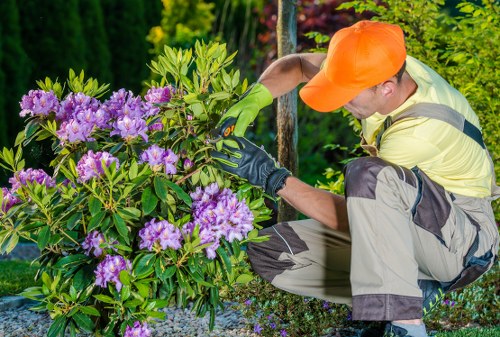
Garden Tools and Equipment
Having the right tools is essential for efficient and effective garden maintenance. Investing in quality equipment can make gardening tasks easier and more enjoyable.
Essential Garden Tools
- Hand Tools: Trowels, hand pruners, and weed pullers are essential for detailed work.
- Power Tools: Lawn mowers, trimmers, and hedge cutters help manage larger garden areas.
- Watering Equipment: Hoses, sprinklers, and watering cans ensure your plants receive adequate moisture.
Choosing the Right Tools
Select tools based on the size of your garden and the specific tasks you perform regularly. Ergonomic designs can reduce strain and improve comfort during extended gardening sessions.
Tool Maintenance Tips
Keeping your garden tools in good condition extends their lifespan and ensures they perform effectively. Regular cleaning, sharpening, and proper storage are key aspects of tool maintenance.
For power tools, follow manufacturer guidelines for maintenance and safety checks to prevent malfunctions and accidents.
Innovative Gardening Gadgets
Modern gardening gadgets, such as soil moisture sensors and smart irrigation controllers, can enhance your garden maintenance routine. These technologies provide real-time data and automate tasks, making gardening more efficient.
Benefits of Using High-Quality Tools
High-quality tools not only last longer but also make tasks easier and more precise. Investing in durable equipment reduces the need for frequent replacements and improves your overall gardening experience.
Eco-Friendly Gardening Tools
Eco-friendly tools, such as manual water pumps and solar-powered equipment, minimize environmental impact and promote sustainable gardening practices.
Choosing sustainable tools aligns with environmentally conscious gardening, contributing to a healthier garden and planet.
Professional Garden Maintenance Services in Southgate
While DIY garden maintenance can be fulfilling, hiring professional garden maintenance services in Southgate offers numerous benefits, especially for larger or more complex gardens.
Advantages of Professional Services
- Expertise: Professionals bring knowledge and experience, ensuring high-quality maintenance and problem-solving.
- Time-Saving: Outsourcing tasks frees up your time for other activities or allows you to enjoy your garden without the stress of maintenance.
- Comprehensive Care: Professional services often provide a wide range of maintenance options, from landscaping and pruning to pest control and irrigation management.
Choosing the Right Garden Maintenance Service
When selecting a garden maintenance service in Southgate, consider factors such as reputation, range of services offered, pricing, and customer reviews.
Requesting quotes and discussing your specific needs with potential providers can help you make an informed decision.
Customizable Maintenance Plans
Tailored maintenance plans ensure that your garden receives the specific care it needs. Whether you require regular lawn mowing, seasonal planting, or specialized pruning, professional services can accommodate your preferences.
Eco-Friendly Garden Services
Many garden maintenance companies offer eco-friendly options, utilizing sustainable practices and organic products. Choosing these services supports environmental conservation and promotes a healthier garden ecosystem.
Long-Term Garden Health with Professional Care
Consistent professional maintenance helps maintain garden health over the long term. Regular care prevents issues from developing and ensures that your garden remains a beautiful and relaxing space.
Enhancing Property Value
A well-maintained garden enhances your property's curb appeal and can increase its market value. Professional garden maintenance ensures that your outdoor space makes a positive impression on visitors and potential buyers.
DIY Garden Maintenance Tips
For those who prefer a hands-on approach, DIY garden maintenance offers the satisfaction of nurturing your own outdoor space. Here are some tips to help you maintain your Southgate garden effectively.
Planning and Organization
Effective garden maintenance starts with proper planning and organization. Create a maintenance schedule that outlines tasks for each season, ensuring that no aspect of your garden is overlooked.
Keeping a gardening journal can help you track plant growth, record maintenance activities, and plan future projects.
Proper Watering Techniques
Understanding the water needs of your plants is crucial. Overwatering can lead to root rot and other issues, while underwatering can stress plants and limit growth.
Use a moisture meter to monitor soil moisture levels and adjust your watering routine accordingly.
Weed Control Strategies
Weeds compete with your plants for nutrients and water, making regular weed control essential. Mulching, manual weeding, and using natural weed barriers can help manage unwanted growth.
- Mulch: Apply a layer of mulch to suppress weeds and retain soil moisture.
- Hand Weeding: Regularly remove weeds by hand to prevent them from spreading.
- Natural Barriers: Use landscape fabric or dense plantings to limit weed growth.
Composting at Home
Starting a compost bin at home allows you to recycle kitchen scraps and garden waste into valuable compost for your garden. Compost enriches the soil, improves structure, and enhances fertility.
Maintain a balanced compost pile by combining green materials (e.g., vegetable scraps) with brown materials (e.g., dried leaves) to facilitate decomposition.
Pest Prevention Tips
Preventing pests before they become a problem is more effective than dealing with infestations. Introduce beneficial insects, use companion planting, and maintain garden cleanliness to reduce pest attraction.
Regularly inspect your plants for signs of pests and address issues promptly to maintain a healthy garden.
Homemade Pest Repellents
Create natural pest repellents using ingredients like garlic, neem oil, or chili pepper. These homemade solutions can deter pests without harming beneficial insects or the environment.
Benefits of DIY Maintenance
DIY garden maintenance fosters a deeper connection with your outdoor space and allows for creative expression. It also provides control over the methods and materials used, aligning with personal preferences and environmental values.
By implementing these tips, you can achieve a beautiful and sustainable garden through dedicated DIY efforts.
Landscaping Ideas for Southgate Gardens
Enhancing your garden with creative landscaping ideas can transform it into a stunning outdoor retreat. Here are some ideas to inspire your Southgate garden design.
Creating Outdoor Living Spaces
Design outdoor living areas such as patios, decks, or gazebos to extend your living space and provide a venue for relaxation and entertainment.
- Patios: Use materials like stone or pavers to create a durable and attractive patio surface.
- Decks: Wooden decks offer a natural aesthetic and can be customized with railings and built-in seating.
- Gazebos: Provide shade and shelter, making them ideal for outdoor gatherings.
Incorporating Water Features
Water features such as fountains, ponds, or waterfalls add a soothing element to your garden. They attract wildlife and create a tranquil atmosphere.
Choose a water feature that complements your garden's size and style, ensuring it integrates seamlessly with the existing landscape.
Dividing Spaces with Plants
Use hedges, trellises, or garden structures to define different areas within your garden. This can create a sense of organization and highlight specific features.
Climbing plants like ivy or roses can be trained on trellises, adding vertical interest and privacy to your garden spaces.
Garden Lighting Solutions
Strategic lighting enhances the beauty of your garden at night and improves safety. Use a combination of ambient, task, and accent lighting to highlight pathways, plants, and architectural features.
- Solar Lights: Eco-friendly and easy to install, solar lights are perfect for illuminating pathways and garden beds.
- String Lights: Create a cozy ambiance by draping string lights over pergolas or outdoor seating areas.
- Spotlights: Use spotlights to accentuate focal points like trees, statues, or water features.
Choosing the Right Garden Furniture
Select garden furniture that complements your garden's style and meets your comfort needs. Materials like wood, metal, and rattan offer durability and aesthetic appeal.
Incorporate comfortable seating, tables, and storage solutions to create functional and inviting outdoor spaces.
Using Native Plants for Landscaping
Native plants are well-adapted to Southgate's climate and soil conditions, making them low-maintenance and resilient. Incorporating native species into your landscaping promotes biodiversity and supports local wildlife.
Vertical Gardening Ideas
Maximize space and add visual interest with vertical gardening techniques. Use trellises, vertical planters, or living walls to grow plants upward, creating a lush and dynamic garden environment.
Conclusion
Effective garden maintenance in Southgate involves a combination of seasonal care, proper plant selection, soil management, pest control, and thoughtful landscaping. By implementing these strategies, you can create and sustain a beautiful, healthy garden that serves as a haven for relaxation and enjoyment.
Whether you choose to undertake garden maintenance yourself or enlist the help of professional services, the key is consistency and attention to detail. Embrace the joy of gardening and transform your Southgate garden into a stunning outdoor sanctuary.
Contact us today to learn more about our garden maintenance services and how we can help you achieve the garden of your dreams. Book your service now and take the first step towards a more beautiful and thriving garden.